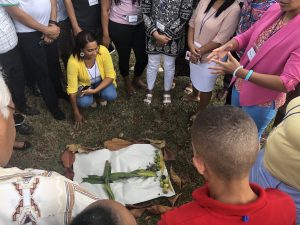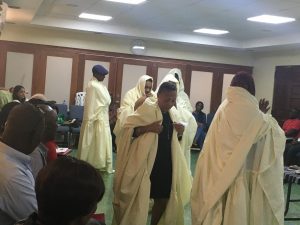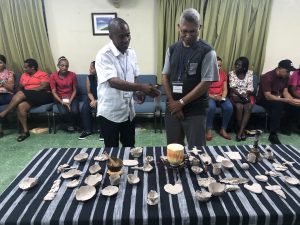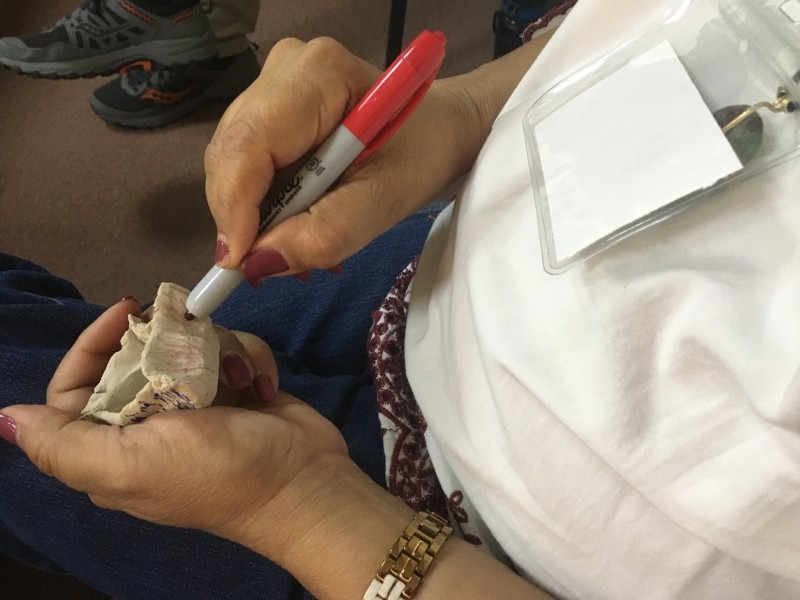
This is the second in a three-part series of reflections about Playing in the Pain.
Playing with Perspective: Reframing Relationships
By Mylinda Baits, Global Consultant for Training with the Restorative Arts
Covid-19 has me grounded from travel. While happy to be sheltering in place with my husband and daughter, this worldwide pandemic has me feeling far away from others I love. Creativity calls me to reinvent personal hygiene practices now that our toilet paper has run out (we didn’t overbuy at the outset). Perhaps you can relate. From my relative safety and minimal discomfort, my perspective shifts drastically when I imagine what the impact of this global pandemic is having on some of my global friends. Christina, Lance, Boaz, Sofia, Philip, Ernesto, Marisol, Leandro, Ketly, Ruth, Xinia, so many more…. In my prayers, I 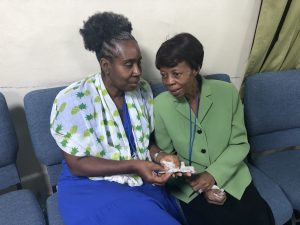 remember their faces, hear their singing, smell the tortillas cooking over the leña (firewood), feel the footsteps on the roads that lead to their homes, churches and community centers. I am grateful for the imprints they’ve made on my heart, the insights they’ve left in my mind, the impact they’ve had on my spirit, and the interconnectedness we’ve nurtured. When I think of the challenges they face, I am anguished. Besides job loss and unrelenting anxiety around limited access to basic services like water, food, schools, banks, and hospitals, the fear of contracting the illness and death is real for many of them. The situation can seem dire, leaving us feeling separated, stuck with nowhere to go, and no way to escape. The contagious anxiety of waiting for this to end creeps into our days like an unrelenting invader. We are all experiencing huge shifts, as Jim Wallis of Sojourners says, “This moment will change us; we will not be the same afterward— how it changes us will depend on how we “redeem the time.” This is based on Ephesians 5:16 “So watch your step. Use your head. Make the most of every chance you get. These are desperate times!”
remember their faces, hear their singing, smell the tortillas cooking over the leña (firewood), feel the footsteps on the roads that lead to their homes, churches and community centers. I am grateful for the imprints they’ve made on my heart, the insights they’ve left in my mind, the impact they’ve had on my spirit, and the interconnectedness we’ve nurtured. When I think of the challenges they face, I am anguished. Besides job loss and unrelenting anxiety around limited access to basic services like water, food, schools, banks, and hospitals, the fear of contracting the illness and death is real for many of them. The situation can seem dire, leaving us feeling separated, stuck with nowhere to go, and no way to escape. The contagious anxiety of waiting for this to end creeps into our days like an unrelenting invader. We are all experiencing huge shifts, as Jim Wallis of Sojourners says, “This moment will change us; we will not be the same afterward— how it changes us will depend on how we “redeem the time.” This is based on Ephesians 5:16 “So watch your step. Use your head. Make the most of every chance you get. These are desperate times!”
In these desperate times, I’m looking for clues as to what to do now. How can I see this as an invitation to relate differently, with a deeper and wider appreciation of who we are called to be for such a time as this? The phrase from Isaiah 30:15 has been helpful in shifting my perspective. I would call it a reframing of sorts. I’ve been breathing and praying this phrase to help me reframe the situation as invitation instead of invasion. “In returning and rest you shall be saved; in quietness and in trust shall be your strength.” This return home and unexpected rest from travel responsibilities are in many ways, saving me. The invitation to pause, be present, and ponder existential questions about life and loss, connection and disconnection, fear and faith, sickness and health, solitude and solidarity has been an unexpected gift. Surprisingly, I am finding renewed strength and creativity in the resulting quiet of spirit and trust. Shifts in travel dependent ministry have meant nurturing more social closeness and restorative art-making via Zoom and video conferencing. Just yesterday I adapted a contemplative photography exercise that I used in a leadership retreat in the Dominican Republic for a weekly online Art Date that I’m piloting to provide psychosocial support for care providers sheltering in place.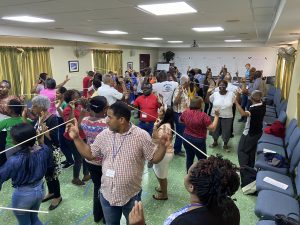
In late February of 2020, I joined my International Ministries colleagues, Tim Long, Mercedes Gonzalez-Barnes and Peter McCurdy to co-facilitate a spiritual retreat with 50 Dominican faith leaders. We engaged in creative community-building, sacred and supportive conversations, silent reflection, scripture study, singing, sharing food and fellowship. For years, because of complex conflict, these folks who represented four distinct communities, hadn’t shared the same space. There was a desire to repair relational ruptures, meeting across their differences, to build new networks of support and mutual learning. I was tasked with creating the spaces for community building and arts-based reflection. We explored a variety of art forms ranging from clay work, drama, movement, song, symbolic imagery, photography and creative writing.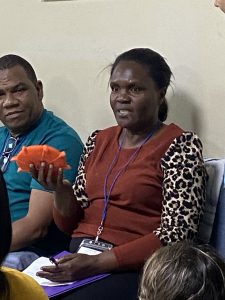
The contemplative photography activity seemed to touch many of the participants in profound ways. The invitation was to explore their surroundings and document, using our cell phone cameras, glimmers of inspiration. It was a practice in pausing to pay attention, looking for details that are present but often go unnoticed, being present and open to what is right in front of us. It was a reminder to see in a new way, to reframe “reality”, to find the treasures hidden in plain sight. Each participant was encouraged to capture no more than 10 photos. Later with their partner, they shared 3 of the images that most touched them and why. Then they were encouraged to write about what their images wanted them to know. One participant shared that the process helped them to notice the intricate design to the smallest detail in God’s handiwork of creation. They felt both humbled and amazed at themselves as a part of God’s creation, so unique and wonderfully made. This translated into how they saw their neighbor and their enemy. God’s creation and image is in each person, so all of us, no matter who we are, deserve respect and dignity. A simple photography exercise expanded empathy and reframed the value of relationships.
Azure sea
Pulsating, rolling, colliding
Gentling kisses the rocks
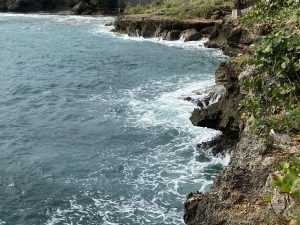
Explodes into a thousand droplets
Ripples rise and fall
Sparkles dance
Patterns form
Change
Remain the same
Something beneath the surface
Beckons me to behold
Be held
Be
-written during the DR retreat by M. Baits
Playing with perspectives in these desperate times, whether exploring the vastness of the universe or the 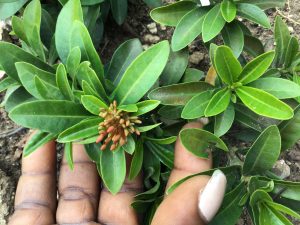 micro-details of a leaf or sea, can help to reframe our relationships. Playing in, or seeing the pain from a different perspective, reminds me to redeem the time, to make the most of every chance I get, whether here in Olympia, WA or in Cuba, Croatia or Kenya, to honor and give thanks for this breath, this moment, this day, these people I’ve been given. I invite you to try this practice for yourself. Use your cell phone as a creative tool. In quietness and trust, explore your surroundings through your camera lens. See what finds you, what captures your attention. Create an image. Ask it what it wants to teach you. Share it with a friend. See what happens when you play in the pain. Tell me about it. I’d love to hear how you’re reframing these days.
micro-details of a leaf or sea, can help to reframe our relationships. Playing in, or seeing the pain from a different perspective, reminds me to redeem the time, to make the most of every chance I get, whether here in Olympia, WA or in Cuba, Croatia or Kenya, to honor and give thanks for this breath, this moment, this day, these people I’ve been given. I invite you to try this practice for yourself. Use your cell phone as a creative tool. In quietness and trust, explore your surroundings through your camera lens. See what finds you, what captures your attention. Create an image. Ask it what it wants to teach you. Share it with a friend. See what happens when you play in the pain. Tell me about it. I’d love to hear how you’re reframing these days.
Paz, Mylinda